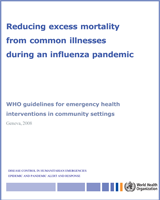NCBI Bookshelf. A service of the National Library of Medicine, National Institutes of Health.
Reducing Excess Mortality from Common Illnesses During an Influenza Pandemic: WHO Guidelines for Emergency Health Interventions in Community Settings. Geneva: World Health Organization; 2008.

Reducing Excess Mortality from Common Illnesses During an Influenza Pandemic: WHO Guidelines for Emergency Health Interventions in Community Settings.
Show detailsThese guidelines were edited by Heather Papowitz1, John Watson, Michelle Gayer, Stephen Martin and Dominique Legros of the Unit for Disease Control in Humanitarian Emergencies (DCE), part of the Epidemic and Pandemic Alert and Response Department in the Health Security and Environment Cluster of the World Health Organization.
These guidelines are a subsidiary product derived primarily from existing WHO guidelines listed in the bibliography, and adapted for the context of communities affected by pandemic influenza. Their development was guided by a review of literature and by expert opinion, with expert technical consensus through working groups from within and outside WHO between June 2007 and April 2008.
The guidelines were produced by the Communicable Diseases Working Group on Emergencies at WHO headquarters. This working group provides technical and operational support on communicable disease issues to WHO regional and country offices, ministries of health, other United Nations agencies, and nongovernmental and international organizations. The working group includes staff from: the departments of Epidemic and Pandemic Alert and Response, Food Safety, Zoonoses and Foodborne Diseases, and Public Health and Environment in the Health Security and Environment cluster; the Global Malaria Programme, Stop TB and HIV/AIDS in the HIV/AIDS, Tuberculosis and Malaria cluster; the departments of Child and Adolescent Health and Development, and Immunizations, Vaccines and Biologicals in the Family and Community Health cluster; Injuries and Violence Prevention and Nutrition for Health and Development in the Noncommunicable Diseases and Mental Health cluster; the department of Essential Health Technologies in the Health Systems and Services cluster; Security and Staff Services in the General Management cluster; the cluster of Health Action in Crises; and the Polio Eradication Initiative.
A meeting of humanitarian agency partners was held in Geneva on 17–18 March 2008 to further develop this document. Key contributions were made by the following participants and their input is gratefully acknowledged: Tammam Aloudat (International Federation of Red Cross and Red Crescent Societies); Kathryn Bolles (CORE); Philippe Calain (Médecins Sans Frontières); Alessandro Colombo (International Rescue Committee); Robin Nandy (United Nations Children's Fund); Eric Starbuck (CORE); Mesfin Teklu (World Vision International); Ron Waldman (United States Agency for International Development). Additional comments were provided by Johan Heffinck (the European Community Humanitarian Aid department) and by the US Centers for Disease Control and Prevention. All external experts/contributors have signed declarations of interest in accordance with WHO policy and no conflict of interests were declared. The declarations of interest are available on request.
The following WHO staff were involved in the development and review of this document and their contribution is gratefully acknowledged:
Giuseppe Annunziata, Sylvie Briand, André Briend, Claire-Lise Chaignat, Thomas Cherian, Marthe Evard, Olivier Fontaine, Chantal Gegout, Antonio Gerbase, Sandy Gove, Santhi Mendis, Kirstin McHarry, Lulu Muhe, Mathews Mathai, Zinga Jose Nkuni, Mark Van Ommeren, Salah Ottmani, Kidong park, Shamim Ahmad Qazi, Chen Reis, Peter Strebel, Kaat Vandemaele, Zita Weise-Prinzo, Cathy Wolfheim, Patrick Zuber.
These guidelines may need to be updated as the epidemiological information evolves or as new information emerges. It is anticipated that the recommendations contained in these guidelines will remain valid until 2010. The Department of Epidemic and Pandemic Alert and Response at WHO headquarters will be responsible for their review at that time.
WHO would like to thank the United States Agency for International Development (USAID) and the Office of Foreign Disaster Assistance of the United States (OFDA) for their support in the development of this document.
Footnotes
- 1
Heather Papowitz was seconded by the United States Agency for International Development to DCE for the development of these guidelines.
- Acknowledgements - Reducing Excess Mortality from Common Illnesses During an Inf...Acknowledgements - Reducing Excess Mortality from Common Illnesses During an Influenza Pandemic
Your browsing activity is empty.
Activity recording is turned off.
See more...